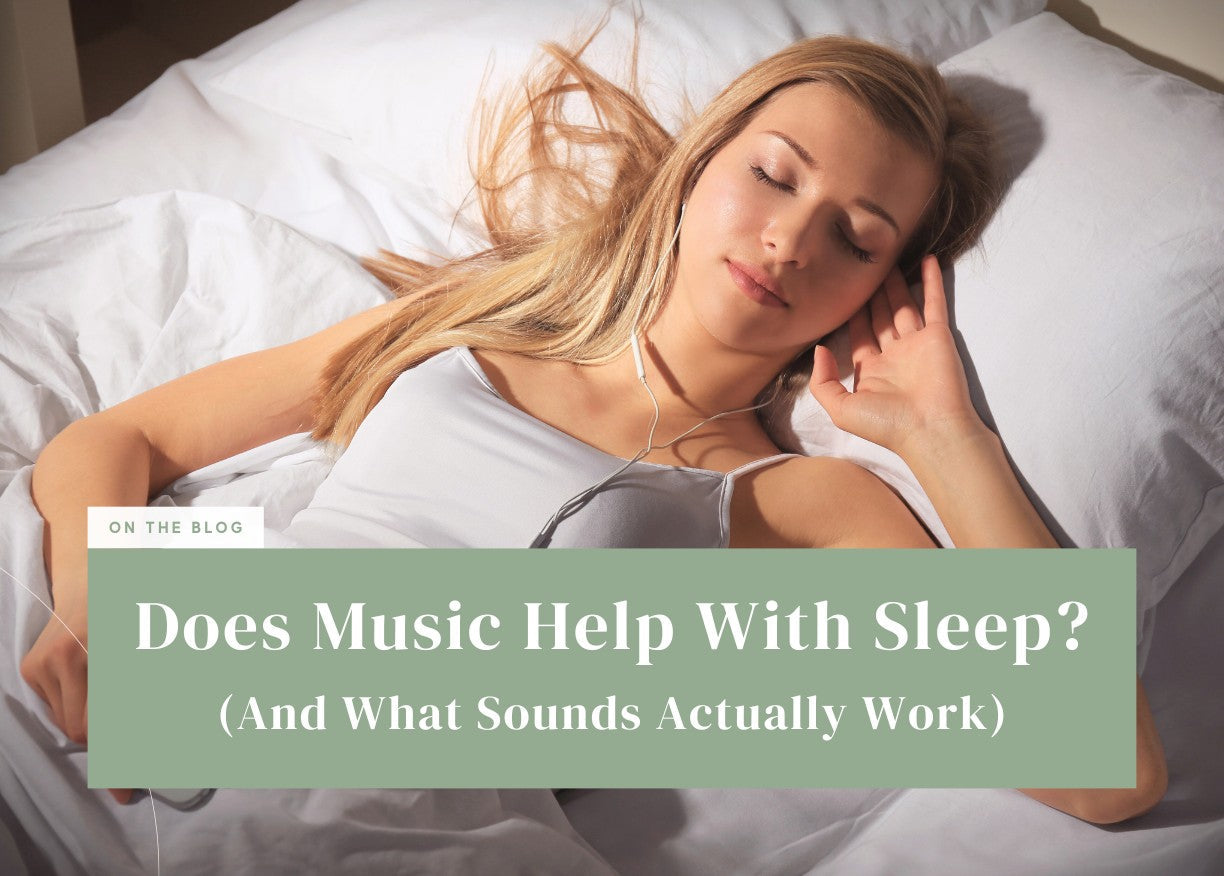Does Music Help With Sleep? (And What Sounds Actually Work)
If you’ve ever dozed off to gentle piano music or the hum of rain, you’re not alone.
Sound can be a powerful sleep tool—if you’re using the right kind.
But not all sounds are helpful. Some can actually keep your brain too alert, while others guide it into a deeper, more restful state.
Here’s what science says about music and sleep—and how to build a playlist (or soundscape) that actually helps.
Why Sound Impacts Sleep

Your brain never fully shuts off—even during deep sleep.
That means sound still gets processed while you’re snoozing.
The right sounds can:
-
Slow your heart rate
-
Lower cortisol levels
-
Calm the nervous system
-
Mask distracting noise (traffic, neighbors, snoring)
But the wrong sounds? They can trigger stress, startle responses, or even vivid dreams that leave you feeling unrested.
Best Sounds for Better Sleep
Here’s what works best according to research and real-world results:
1. White Noise
Think of it as a sound blanket.
White noise masks sudden changes in sound that would normally wake you up—like a car horn or your partner shifting in bed.
✅ Best for:
-
Light sleepers
-
Noisy environments
-
People with anxiety
Try This: Sweet Zzz’s White Noise Machine is designed with premium speaker clarity and 12 non-looping sounds—perfect for calming the brain and staying asleep all night.
2. Nature Sounds

Birdsong? No. Crashing ocean waves? Yes.
Low, rhythmic nature sounds are known to reduce anxiety and improve deep sleep.
✅ Best options:
-
Rainfall
-
Ocean waves
-
Rustling leaves
-
Gentle streams
Avoid anything too sharp or unpredictable (like thunder or chirping birds).
3. Ambient Music & Slow Instrumentals

Simple, slow melodies with no lyrics help cue your brain that it’s time to wind down.
✅ Best features:
-
60–80 BPM (beats per minute)
-
No sudden tempo changes
-
Instruments like piano, harp, or soft strings
You can find curated “sleep” playlists on Spotify, Apple Music, or YouTube. Just watch the ads and autoplay settings—those can be a rude 2 AM awakening.
4. Binaural Beats (for the Curious)

This involves playing two slightly different frequencies in each ear. Your brain interprets the difference as a rhythmic pulse, which some say can guide you into deeper brainwave states.
Research is still emerging, but some find it effective for calming racing thoughts.
Requires headphones—so it’s not for everyone, especially if you toss and turn.
What to Avoid
Not all sounds are helpful. Avoid:
❌ Lyrics or upbeat tempos
❌ TV or podcasts (your brain keeps listening!)
❌ Inconsistent or unpredictable noise
❌ Apps or videos with ads that pop up suddenly
If the sound isn’t fading into the background, it’s not helping.
How to Build Your Ideal Sleep Sound Routine
-
Use a timer. Let it fade out naturally after 30–60 minutes, or keep it on low overnight.
-
Keep the volume soft. Too loud = overstimulation.
-
Experiment with types of sound to see what your brain responds to best.
-
Try a dedicated sound machine instead of relying on your phone. Fewer distractions, no EMF, and no blue light.
💤 Our Pick:
The Sweet Zzz White Noise Machine comes with 12 expertly balanced tones—including white, pink, and brown noise—plus natural sounds like ocean waves and rainfall.
It's small, stylish, and surprisingly powerful. Perfect for bedrooms, nurseries, or travel.
Final Thoughts
Yes, music and sound can help with sleep—when done right.
The key is finding what works for your unique brain and sticking to a calming routine.
If you’ve been struggling to fall asleep or stay asleep, sound might be the missing piece.





